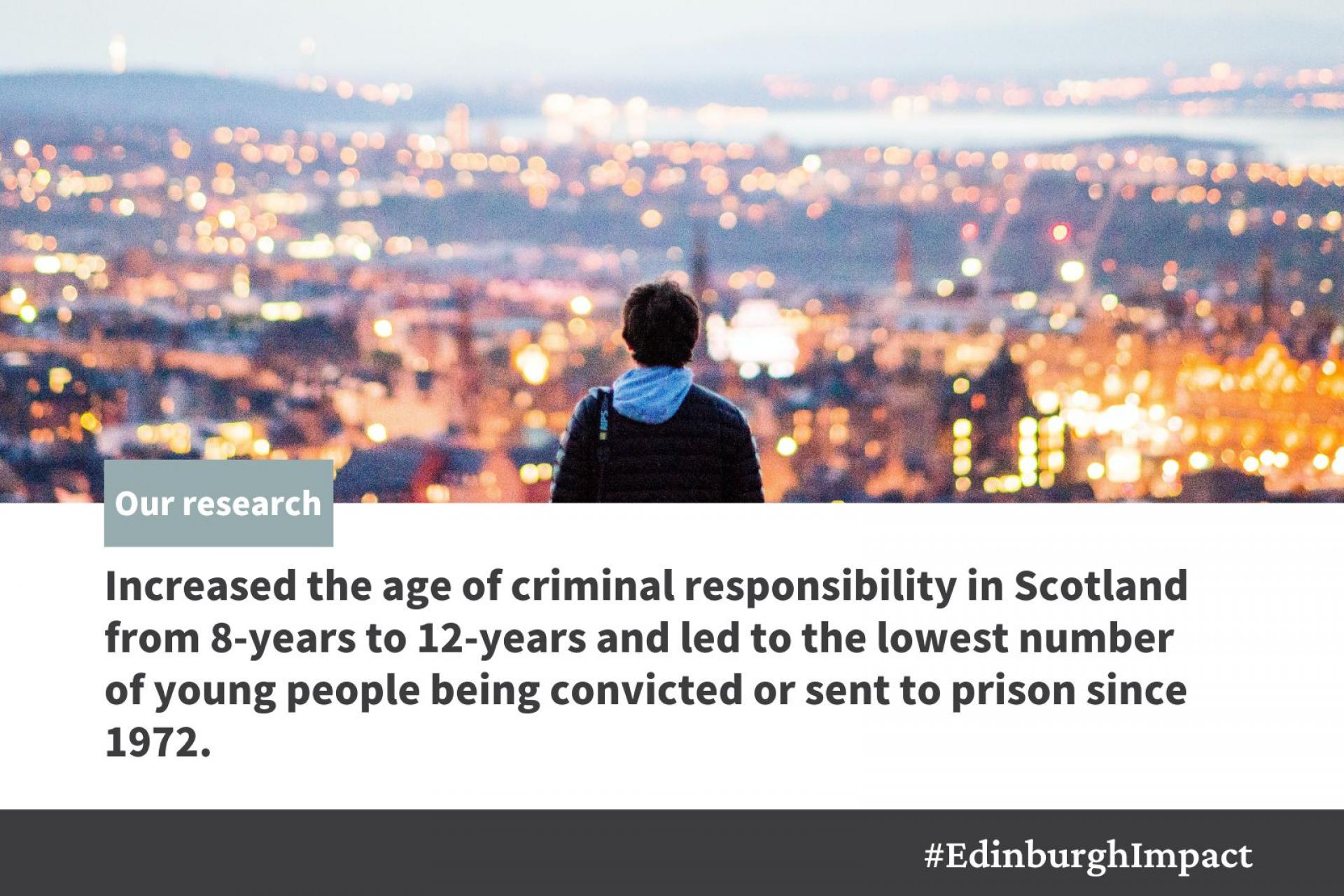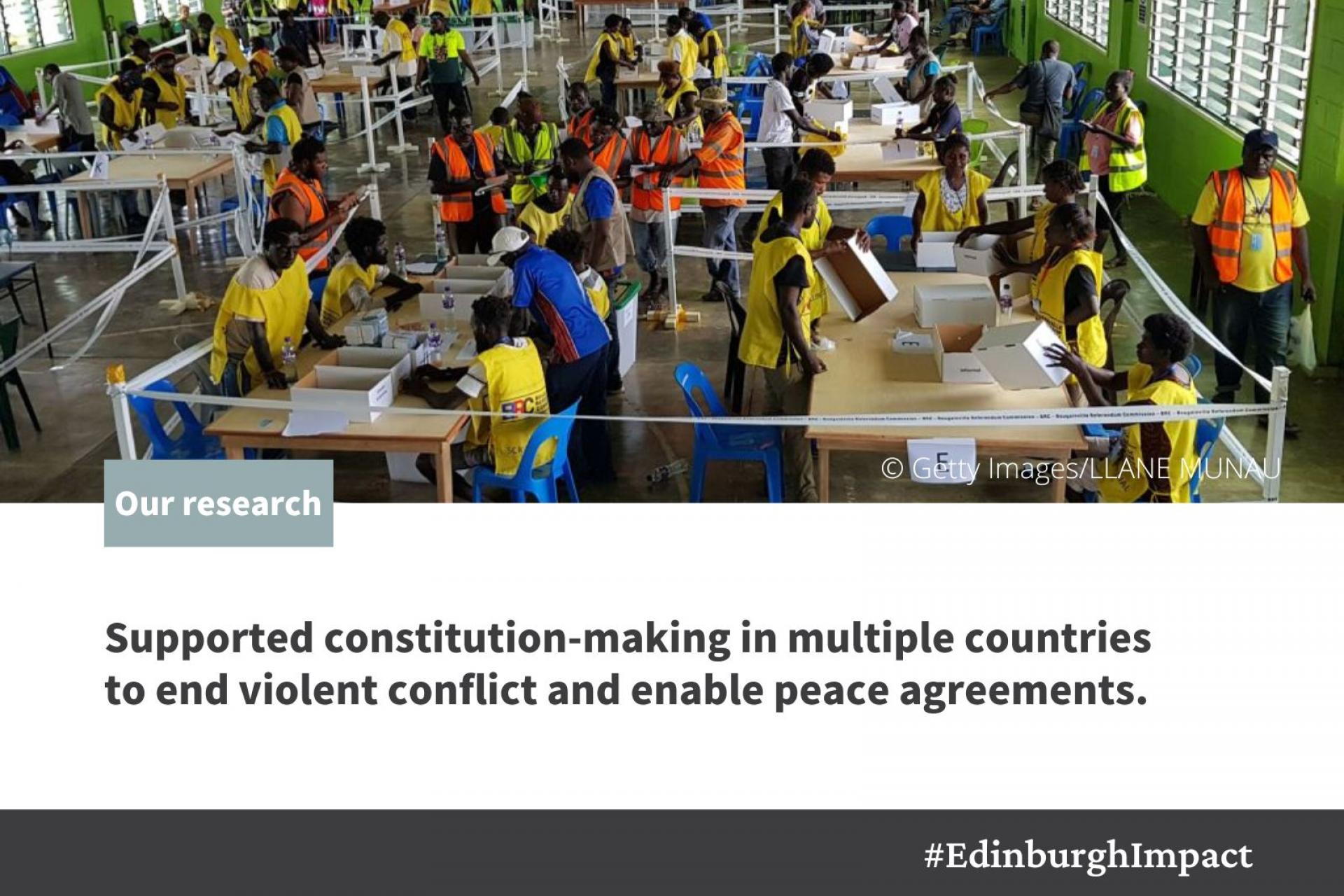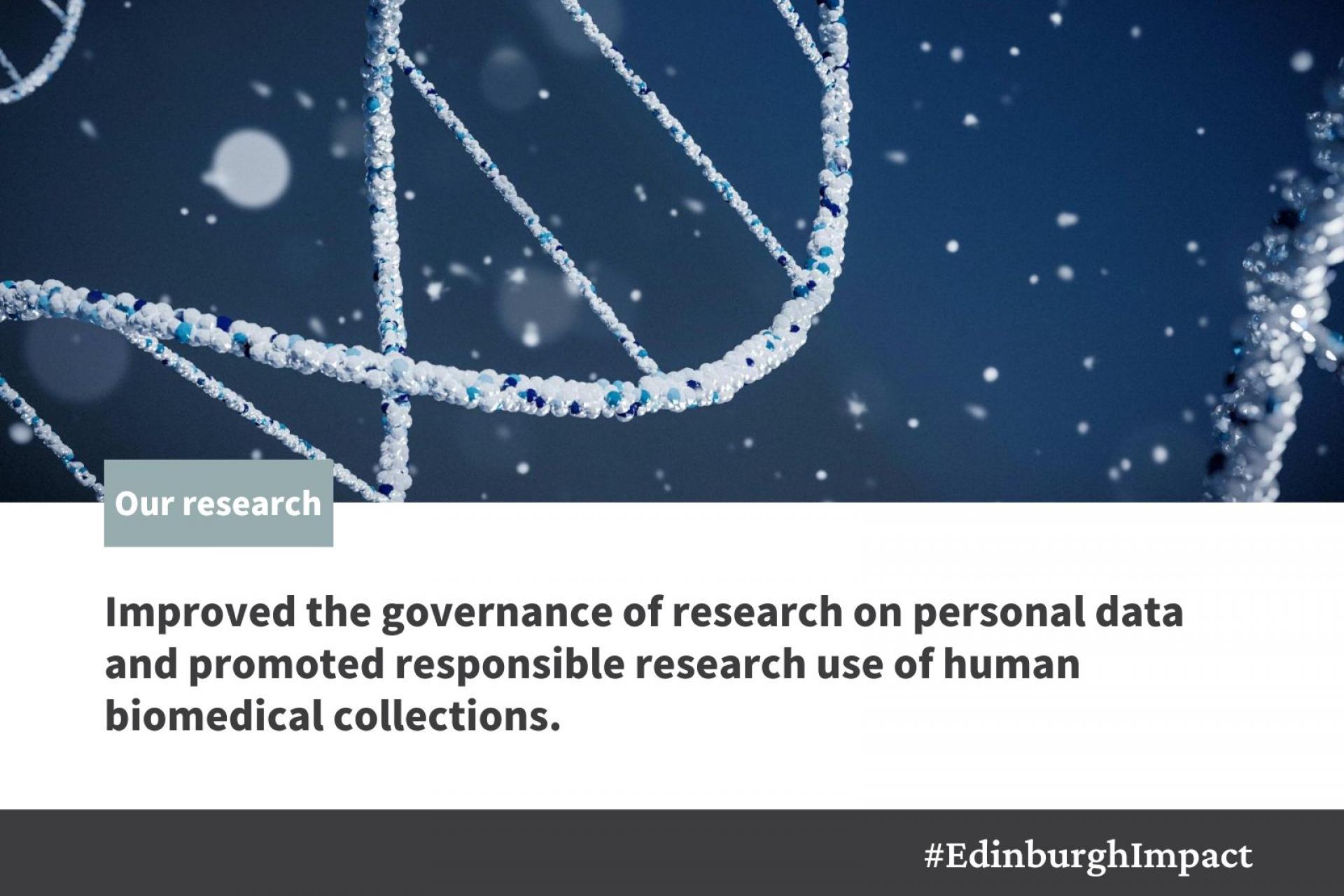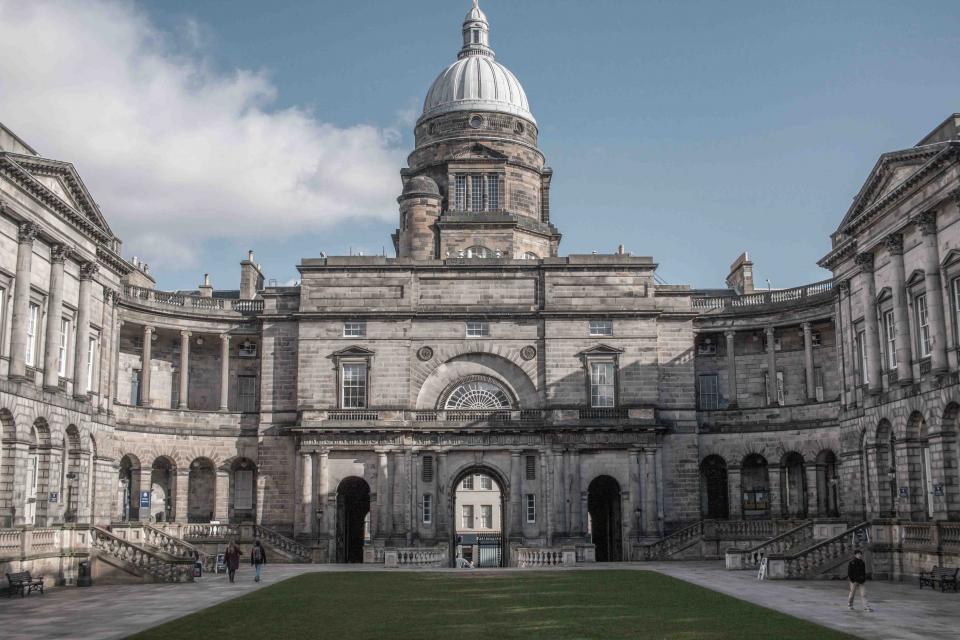REF2021 at Edinburgh Law School
The Research Excellence Framework (REF) is the UK's system for assessing the quality of research in UK higher education institutions. It is undertaken by the four UK higher education funding bodies: Research England, the Scottish Funding Council (SFC), the Higher Education Funding Council for Wales (HEFCW), and the Department for the Economy, Northern Ireland (DfE). The funding bodies aim to secure the continuation of a world-class, dynamic and responsive research base across the full academic spectrum within UK higher education.

Edinburgh Law School is ranked 3rd in the UK for law for the quality and breadth of our research by Research Professional.
Edinburgh Law School deeply values the remarkable range of ideas and influences that a research community of our scale produces; not least through collaboration with researchers and research users, and through service to the discipline and wider society.
This ethos underpinned the entirety of our REF2021 submission and, as a result, we are delighted that Edinburgh Law School has proven its extraordinary strength in every area of assessment – from our research environment to our research outputs to the difference that we make in the world.
Edinburgh Law School is incredibly proud to have been recognised as having a 100% world-leading research environment in the REF2021 exercise.
Edinburgh Law School is a dynamic and inclusive community of legal, sociolegal and criminology scholars. We empower staff at all career stages to realise ambitious research and impact goals in commercial law; criminal law and evidence; criminology; EU law; international law; IP, media and technology law; legal history; legal theory; medical law and bioethics; private law; and public law. In 2018, we returned to our landmark Old College home following a transformative £35 million internal refurbishment, which has created a cohesive infrastructure for interaction and collaboration, and allowed us to expand the critical mass and quality of our environment.
Learn more about our research areas
Over the assessment period, we progressed work on substantive research themes that represent distinctive strength traversing different areas, including law and global justice, law and challenges of change, and law and (in)equalities.
Learn more about our research themes
Our research centres, institutes and networks are an integral part of the Edinburgh Law School community. They continue to thrive and support our research by connecting researchers at all career stages working in specific fields and facilitating dissemination through outward-facing activities.
Learn more about our research centres, institutes and networks
Edinburgh Law School continues its excellence in research and 80% of our research outputs have been rated as either world-leading or internationally excellent in REF2021.
Edinburgh Law School seeks to empower staff at all career stages to realise ambitious research and impact goals. We endeavour to ensure disciplinary legacy in areas of strength, to foster promising fields of research, and to sustain our position as a discipline leader in winning external funding to support our vision.
We contribute discipline-leading insights on questions concerning the devolved, national, European and international legal arenas as well as at their intersection. We harness legal, sociolegal and criminological research to realise a more just and equitable society, and we explore the potential and limits of law in responding to fast-paced change.
We spearhead interdisciplinary research through funded projects, internal appointments and external collaboration; and apply diverse methodologies, with particular strengths in comparative, empirical and historical inquiry.
Edinburgh Law School endeavours to make a difference and we are pleased that 92% of our impact case studies have been rated as either world-leading or internationally excellent.
Edinburgh Law School has a long tradition of supporting impactful research that makes a difference locally and makes a difference globally. Both within and beyond the UK, our researchers contribute expertise through advisory roles and secondments, and our work is cited regularly in the Scottish courts and UK Supreme Court and by Advocates General at the Court of Justice of the European Union.
Learn more about our impact and engagement
In the REF2021 assessment, we submitted case studies on the following themes:
Constitution-Making as a Tool for Ending Conflict and Supporting Peace Processes
Research by Professor Christine Bell, Professor Stephen Tierney and Dr Asanga Welikala provided a novel mapping of the connections between peace processes and constitution-making, with multiple impacts including: (i) facilitating solutions to legal logjams in Colombia and Ethiopia to enable peace agreements; (ii) supporting ongoing constitutional development to address the sub-state claims of ethnic armed organisations in Myanmar; and (iii) proposing strategies to support the peaceful conduct of a controversial referendum in Bougainville/Papua New Guinea. Researchers actively engaged governments and non-state armed opponents in peace and transition processes; and supported key non-governmental and inter-governmental organisations as well as third-party states facilitating those processes.
Limiting Executive Discretion after Brexit
Professor Stephen Tierney’s research has enabled UK lawmakers to limit executive discretion in planning for Brexit. Through his role as one of two legal advisers to the House of Lords Constitution Committee, together with Professor Mark Elliott (Cambridge), Prof Tierney’s work shaped the European Union (Withdrawal) Act 2018 in two crucial ways: (i) clarifying the status of ‘retained EU law’ and case law of the Court of Justice of the European Union; and (ii) constraining delegated powers exercised by the UK Government, through ensuring rigorous scrutiny by parliamentary committees. These reforms curbed executive discretion and built vital safeguards for Parliament into the Brexit process.
Navigating Inclusion in International Peace Processes
Major new data on peace and transition processes produced by the Political Settlements Research Programme identified the need for inclusion of more diverse constituencies at all stages of the process. Extensive comparative analysis demonstrated how to navigate political tensions between strategies aimed at inclusion of the armed actors responsible for conflict and strategies aimed at wider inclusion. It provided an evidence-base that was critical to interrelated impacts on: (i) new international laws on inclusion; (ii) new practices supporting the inclusion of women in UN peace mediation; and (iii) new global policies on the development-peace nexus.
Protecting and Promoting Public Interest in the Regulation of Human Health Research
A work programme on health research regulation within the Mason Institute (2012-2020) – focussing on public benefits of regulation – resulted in multiple changes to practice in regulatory environments, both nationally and internationally. These include: (i) improving governance mechanisms for research on personal data across health and non-health sectors; (ii) promoting the responsible research use of human biomedical collections in the UK and Europe; and (iii) influencing UK law reform to better capture the role of public interest in research regulation. The main beneficiaries are researchers, funders and regulators faced with navigating the complexities governing contemporary human health research.
Raising the Age of Criminal Responsibility in Scotland and Reducing Youth Offending
The Edinburgh Study of Youth Transitions and Crime (ESYTC) had two main impacts: (i) it was the primary evidence-base underpinning the introduction of radical legislation that increased the age of criminal responsibility in Scotland from 8 to 12; and (ii) it formed the evidence-base for two new youth justice strategies: the Scottish Prison Service’s ‘Vision for Young People in Custody’ and the Scottish Government’s ‘Youth Justice Strategy 2015-20’, which together led to substantial reductions in the number of young people being convicted (34% fall since 2015) and sent to prison (45% fall since 2015) – the lowest figures since 1972.
Reducing Stop-and-Search and Increasing Fairness and Effectiveness in Policing Practice in Scotland
Professor Susan McVie and Dr Kath Murray’s work transformed the law, policy and practice of stop-and-search in Scotland. They achieved this by: (i) increasing parliamentary, governmental, organisational and public scrutiny; (ii) influencing major legislative reform (Criminal Justice (Scotland) Act 2016), which abolished non-statutory search; (iii) co-producing a new Code of Practice; (iv) improving police recording; and (v) influencing widespread cultural change within Police Scotland, including the delivery of stop-and-search retraining to all officers. As a result, police now conduct fewer searches, more fairly and effectively, with greater success: between 2014/15 and 2018/19, recorded searches fell from 426,000 to 32,300 per annum.








